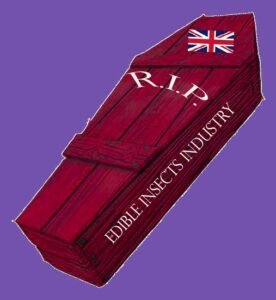Brexit disaster story – A self inflicted fiasco

The edible insect industry in Europe is the fastest growing, sustainable protein sector in the world. In the UK, however, it has all but ground to a halt since Brexit, because a change in law has yet to decide the legal status of edible insects, leaving the industry in disarray.
The new rulings come from the Food Standards Agency, which is questioning the legitimacy of edible insects as a food source. It’s asking producers of edible insects, who had all been legally trading up until Brexit, to submit a novel food application and scientific dossier to demonstrate safety. The estimated cost for completing the required dossier is 85k-100k Euros per insect species, with each approval taking one to two years. The fact that most SMEs will go out of business as a result, is widely acknowledged. The Bromley Trading Standards Institute states on their website. ” Any business seeking approval for a novel food will probably need to conduct independent scientific research (which will be beyond the technical / financial means of some small and medium-sized businesses).”
It’s understood that the FSA had been seeking legal advice, regarding whether transitional measures [EU 2285/2015 on Novel food, Article 35(2)] have been retained in UK law. These were designed to minimise impact to insect businesses which were already trading when the regulation came into force. To date, the organisation has refused to express an opinion on whether the edible insect industry in the UK is legal or not. In its latest communication the FSA notified the Local Health Authorities [23rd August 2021], that the transitional measures are to be considered expired, but on the other hand, it is ‘reflecting’ on whether to introduce UK specific transitional measures.
Many edible insect producers are SMEs and the impact on them has been devastating. Horizon Insects urban farm, in Ealing, West London, is one of them. Co-founder, Tiziana Di Costanzo, said,
“This sounds like a case of the left hand not knowing what the right is doing. Millions of pounds of public funds, for example through Innovate UK, have gone towards the development of insect-based food. Our company is part of 7 UK-based SMEs, which have recently been granted a share of EU assistance worth 410k Euros towards the development of the edible insect sector. Yet, the FSA is now hindering its very development. Brexit provides an opportunity for the FSA to disentangle the industry from red tape and to state an urgently-needed independent scientific opinion.”
In countries like Australia and New Zealand, species such as Yellow Mealworm have been assessed and categorized as non-traditional but not novel, meaning the food doesn’t have a history of human consumption but no safety risks have been identified. In contrast, in the EU, edible insects were classified as a novel food in 2015, under the definition “foods which have not been widely consumed by people in the UK or EU before May 1997.
Di Costanzo added: “It is difficult to comprehend why, without any consultation or prior notification, we are being forced out of business. At this point we still don’t know if the FSA is planning product recalls from supermarkets, restaurants and online marketplaces. We wrote to the Secretary of State, George Eustice, and received no reply from him or DEFRA. In the public interest, we would welcome a discussion about this. The fact that for millennia more than two billion people in 80% of the world have regularly consumed more than 2000 species of edible insects, and that in Europe, even before the Novel food regulation came into force, millions of people were already eating insects, should be evidence to grant a review of the current Novel Food Status classification”.
Members of the press/media, companies and individuals impacted by this Brexit disaster story can get in touch though our contact form.
One thought on “An untold Brexit disaster story – R.I.P. UK Edible Insects”
Pretty! This has been a really wonderful article. Many thanks for supplying this info.
Comments are closed.